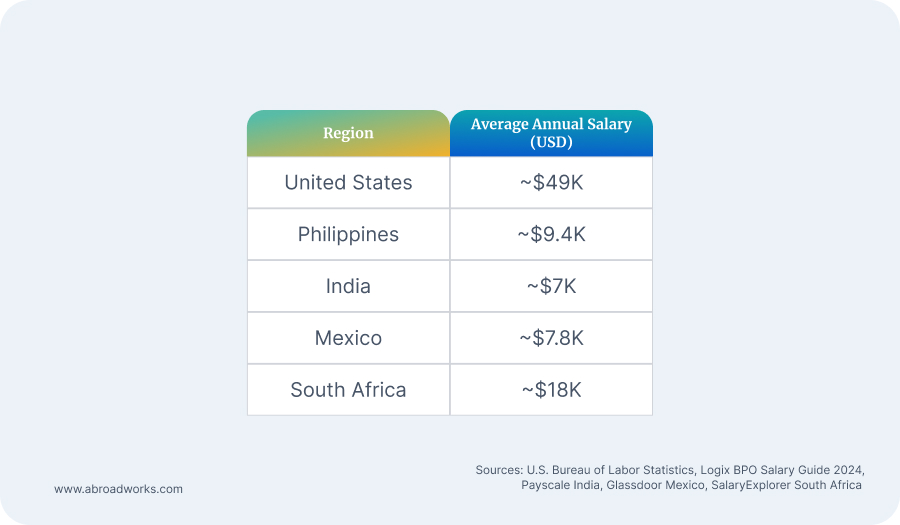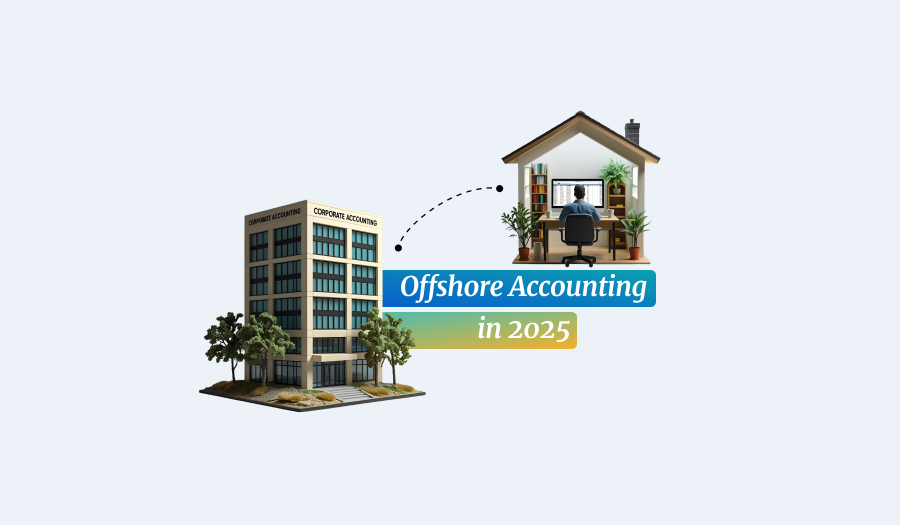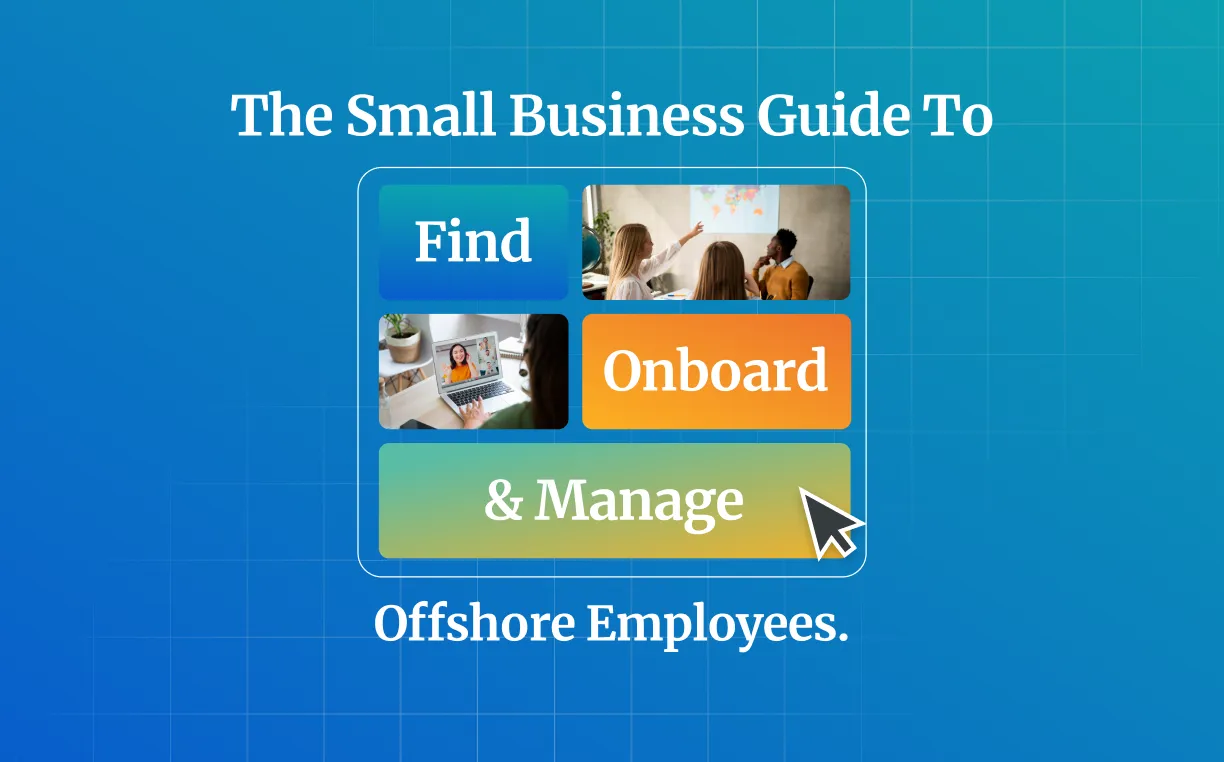Why Offshore Bookkeeping and Accounting Makes Strategic Sense in 2025
Key Takeaways:
- Offshore bookkeeping is a performance upgrade – Teams overseas are often more qualified, tech-savvy, and scalable than in-house staff.
- Follow-the-sun advantage – Offshore teams work across time zones, completing payroll, reconciliations, and reporting while your business sleeps.
- U.S. talent shortage – Declining domestic bookkeeping talent makes offshore hiring a strategic solution for continuity and growth.
- High security and compliance – Reputable offshore providers meet SOC 2, ISO 27001, and other strict standards, often surpassing in-house setups.
- Cost-effective without sacrificing quality – Offshore accounting reduces salaries, taxes, benefits, and overhead by up to 70–88% while maintaining expertise.
- Freedom from spreadsheets – Offshoring allows founders to focus on strategic growth, reclaiming time, energy, and operational efficiency.
Offshore bookkeeping is no longer a mere back-office shortcut but a front-line growth strategy. As of 2025, 37% of U.S. small businesses already outsource at least one function, and 52% plan to outsource even more in the near future. Accounting and IT top the list, with 37% of those businesses choosing to offshore their books (demandsage.com, explodingtopics.com, digitalmindsbpo.com).
At its core, offshore bookkeeping means moving your financial operations into the hands of full-time professionals based overseas. That includes reconciliations, payroll, AP and AR, and month-end closing. Most teams work out of the Philippines, India, Mexico, or South Africa. They operate in the cloud, automate every manual step, and keep things moving while your team sleeps.
The offshore accounting market is now worth 28 billion dollars, growing at more than 8% per year. This is no longer about saving a few bucks on salaries. It is about faster systems, tighter processes, and cleaner reporting. 68% of business leaders now say automation and infrastructure, not labor costs, are their top reason for going offshore (joingenius.com).
What was once dismissed as a cost-cutting move has become a performance upgrade. The smartest companies are not outsourcing. They are rebuilding their back office for speed, scale, and sanity.
What You will Learn:
- Why offshore bookkeepers are often more qualified and more tech-savvy than in-house hires.
- How offshoring boosts efficiency, security, and 24/7 operations.
- Why is it more than saving money, but saving time and strategy.
7 Reasons Why Offshore Bookkeeping Beats In-House (In Every Way That Matters)
The real value that makes offshore bookkeeping the smarter choice in 2025 is not in a cheaper headcount or round-the-clock availability. There is no longer as much risk in outsourcing. Instead, the peril facing small businesses is falling behind. Today’s offshore teams are faster, sharper, and better equipped than most internal setups. These are not temporary hires but performance machines. If your bookkeeping still lives in spreadsheets and missed deadlines, the list below is both advice and a warning shot.
1. Offshore Accountants are not a Downgrade; they are the Upgrade
Offshore is not equivalent to being underqualified. Recently, it often means better trained, more experienced, and more scalable. Countries like the Philippines and India produce CPAs and Chartered Accountants at staggering volumes, with the majority trained in U.S. GAAP and fluent in English. The Philippines alone has over 175,000 CPAs, and India boasts hundreds of thousands of Chartered Accountants.
Still think this is about temps? Over 90% of Fortune 500 firms outsource some accounting functions to India. Not low-level contractors but the same people auditing the Fortune 50s.
2. They are More Tech-Forward Than Your In-House Team
Accounting used to be a paper-pushing slog. Now it is AI, APIs, and automation, and offshore teams are leading the charge. According to the 2024 Accountant Tech Survey, 98% of accountants used AI tools in the past year, and 95% say tech skills are as important as accounting ones.
The best offshore firms specialize in platforms like QuickBooks, Xero, and NetSuite. They also run Zapier, Hubdoc, and OCR tools that flag anomalies before a human ever looks at the numbers. The result is faster closes, cleaner books, and fewer errors. They move like tech companies, not accounting firms.
Furthermore, they are not loose with compliance either. Reputable offshore teams operate within GDPR, PCI-DSS, and SOC 2 frameworks, often with stricter internal controls than most startups ever implement. If you think your in-house team is “safer,” ask when they last ran a security audit, then compare notes.
3. Work Gets Done While You Sleep
Clock out at 6 p.m., and your books keep moving. That is the “follow-the-sun” advantage of offshore bookkeeping. Southeast Asian teams pick up your payroll, reconciliations, and reporting while you rest and, by morning, it is all done.
Instead of waiting on your in-house team’s schedule, offshore talent lets you wake up to finished work. Time zones become your unfair advantage.
4. U.S. Talent Is Drying Up Fast
It is not just harder to find good help; it is statistically unlikely. The Bureau of Labor Statistics projects a 5% decline in bookkeeping jobs by 2033. But the problem runs deeper. More than 300,000 U.S. accountants and auditors have left the workforce in the last two years, and fewer students are stepping in to replace them.
Accounting majors are down nearly 17% over the past five years, and the average CPA is now over 50. Even the AICPA has called it a “pipeline crisis.” This shortage is a right-now bottleneck, not a future problem. Instead of competing in a shrinking domestic labor pool, smart operators are turning to international talent.
With remote work normalized and credentialed pros available globally, geography is no longer a constraint. Offshore accounting is not just an option anymore. It is insurance against a broken system.
5. Security Standards Are Rock-Solid
You lock your doors at night. Your offshore firm encrypts, audits, and authenticates every data packet. The top offshore providers meet SOC 2 Type II and ISO 27001 standards and implement VPNs, MFA, restricted access controls, and regular security audits.
Surprisingly, offshore teams are more secure than your internal setup. They treat your data like a product, not paperwork. Meanwhile, only 17% of U.S. SMBs even encrypt sensitive data internally. Ironically, sending your books overseas may significantly upgrade your data security since over half of small businesses in the U.S. lack basic cybersecurity measures, often believing themselves “too small” to target. Outsourcing does not just mitigate risk; it actively enhances compliance.
6. Yes, it is Way Cheaper, but That’s Not the Whole Story
Let us talk about numbers. A U.S. bookkeeper averages ~$39K/year. In the Philippines? ~$4.5K. That is an 88% cost gap.
But it does not stop at salary. With offshoring, you save on payroll taxes, benefits, office space, and management overhead. That is a 70%+ cost reduction in many cases, all while reallocating budget to roles that move the business forward.

7. You Deserve Better Than a Spreadsheet
What would you do if you never had to touch another spreadsheet?
The generally accepted trend is that founders start the grind by doing everything themselves, well, at least until it burns them out. In fact, we’ve written about that exact journey: the pivot from DIY hero to strategic delegator is what separates scrappy survival from real growth.
Beyond offloading your books being good for your business, it is deeply personal. You reclaim your time, your headspace, your momentum. You stop babysitting transactions and start steering the company.
Myths & Misconceptions
Much of what founders fear about offshoring comes from outdated outsourcing models—not modern offshore partnerships built for small businesses.
- Loss of Control: Founders worry they will lose visibility. In reality, providers now offer structured performance tracking, cost-control dashboards, and productivity monitoring, like a client portal, which gives founders clear oversight without micromanagement. You do not lose control, but you gain it.
- Security Risks: Offshore is actually top tier. For example, AbroadWorks vets every candidate through background checks, assessments, English fluency tests, and role-specific evaluations before placement. Rather than compromising on skill and exposure to risk, you are accessing a broader, better-prepared talent pool.
- Quality Concerns: Offshore accountants often hold equal or superior qualifications to their U.S. counterparts, as we covered in previous paragraphs above.
- Only for Big Companies: Small businesses benefit the most. Specialized partners are purpose-built for SMBs, offering flexible team structures, transparent pricing, and scalable support that fits tight budgets. You do not need a headcount to build momentum.
- Communication Nightmares: The myth of “lost in translation” is outdated. Offshore accounting teams work inside your Slack, Zoom, and shared accounting tools, with daily updates and time-zone handoffs that keep workflows moving while you sleep. Distance becomes an advantage, not a liability.
Cutting corners, particularly with financial records, is a slippery slope towards failure. That is not what offshore bookkeeping is about. Rather, it is about building systems that do not break when you scale. It is how founders buy back their time, reduce risk, and reclaim their focus. Thousands of U.S. businesses are already shifting accounting offshore, and not just for the savings. They are doing it because it works.
U.S. bookkeeping salaries will continue climbing, further widening the cost gap. Automation and AI will continue transforming offshore workflows, allowing remote teams to deliver better speed, quality, and consistency than ever before. And as outsourcing grows more normalized, SMB adoption will surge, leaving late adopters scrambling to keep up.
Furthermore, AbroadWorks is not just another offshore vendor; it is an end-to-end workforce partner. The company combines deep vetting, performance monitoring, and secure payroll infrastructure to give clients complete peace of mind. With specialists trained in U.S. accounting systems, AbroadWorks helps businesses scale faster, save more, and focus on what matters: growth.
Clients consistently cite the responsiveness, quality of hires, and seamless onboarding process as reasons for staying. Whether you are outsourcing your first bookkeeper or building a full offshore finance team, AbroadWorks simplifies every step.
Explore AbroadWorks’ offshore accounting solutions and see how we pair U.S. founders with vetted, top-tier finance talent.
The real value that makes offshore bookkeeping the smarter choice in 2025 is not in a cheaper headcount or round-the-clock availability. There is no longer as much risk in outsourcing. Instead, the peril facing small businesses is falling behind. Today’s offshore teams are faster, sharper, and better equipped than most internal setups. These are not temporary hires but performance machines.






